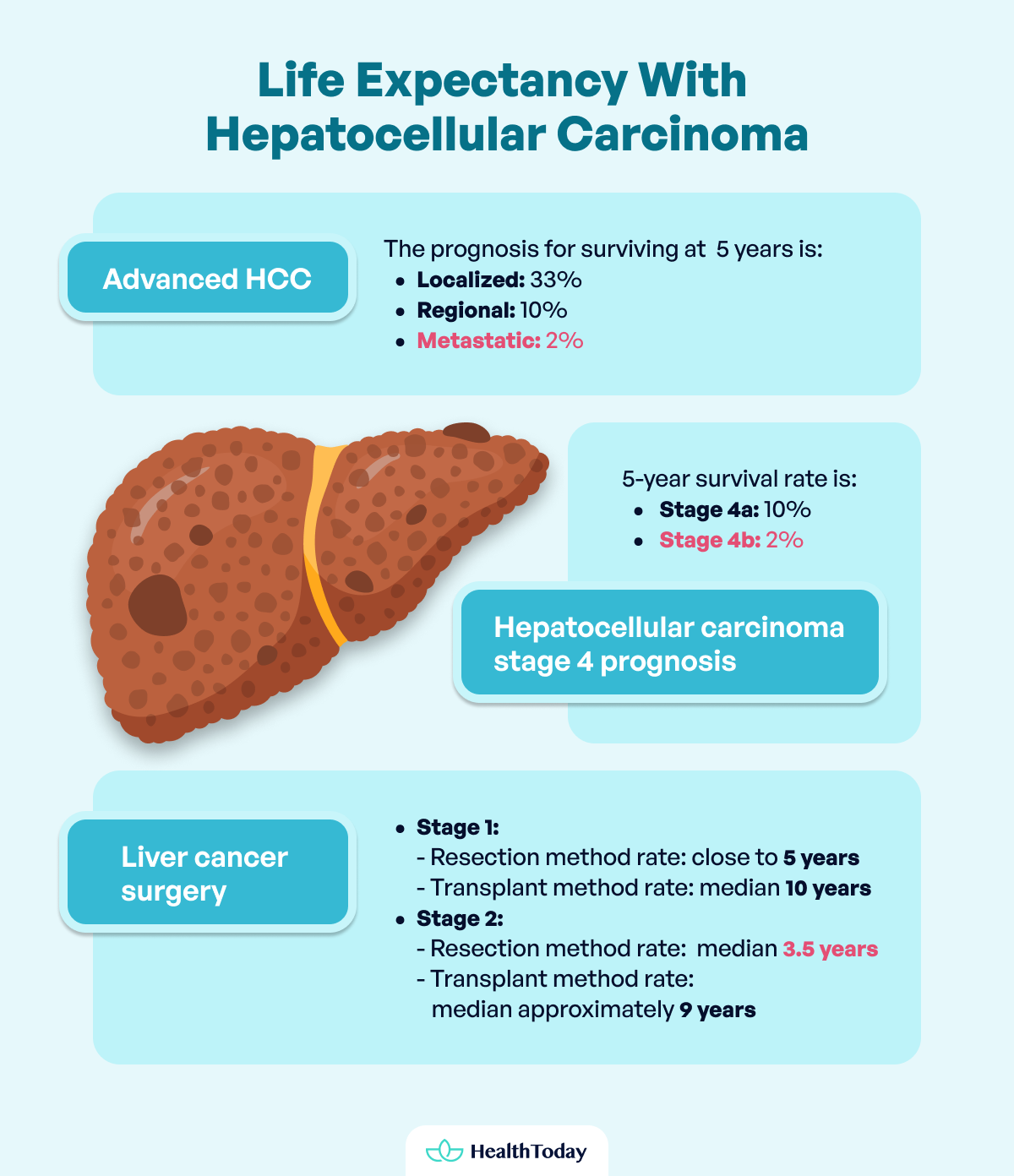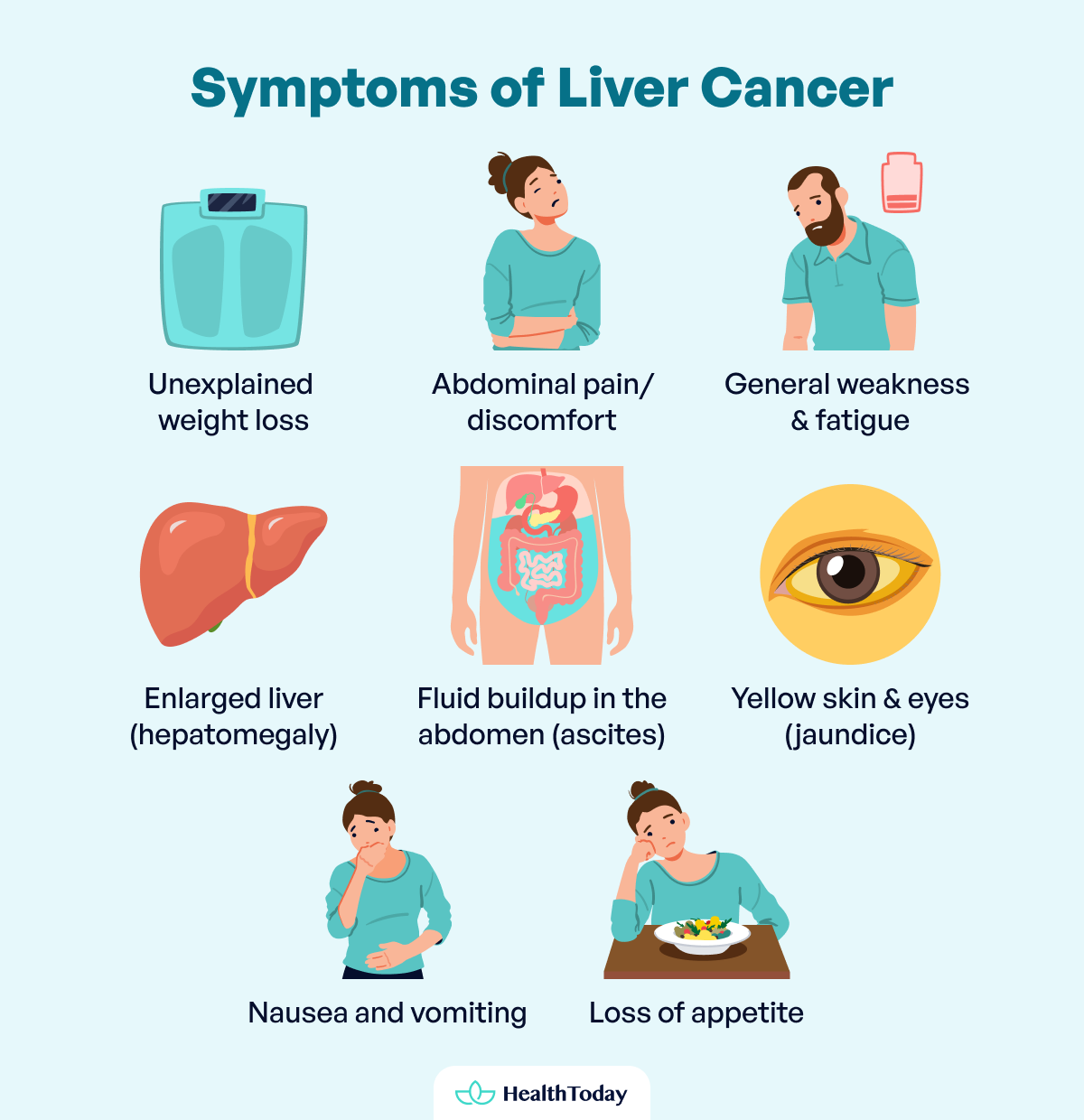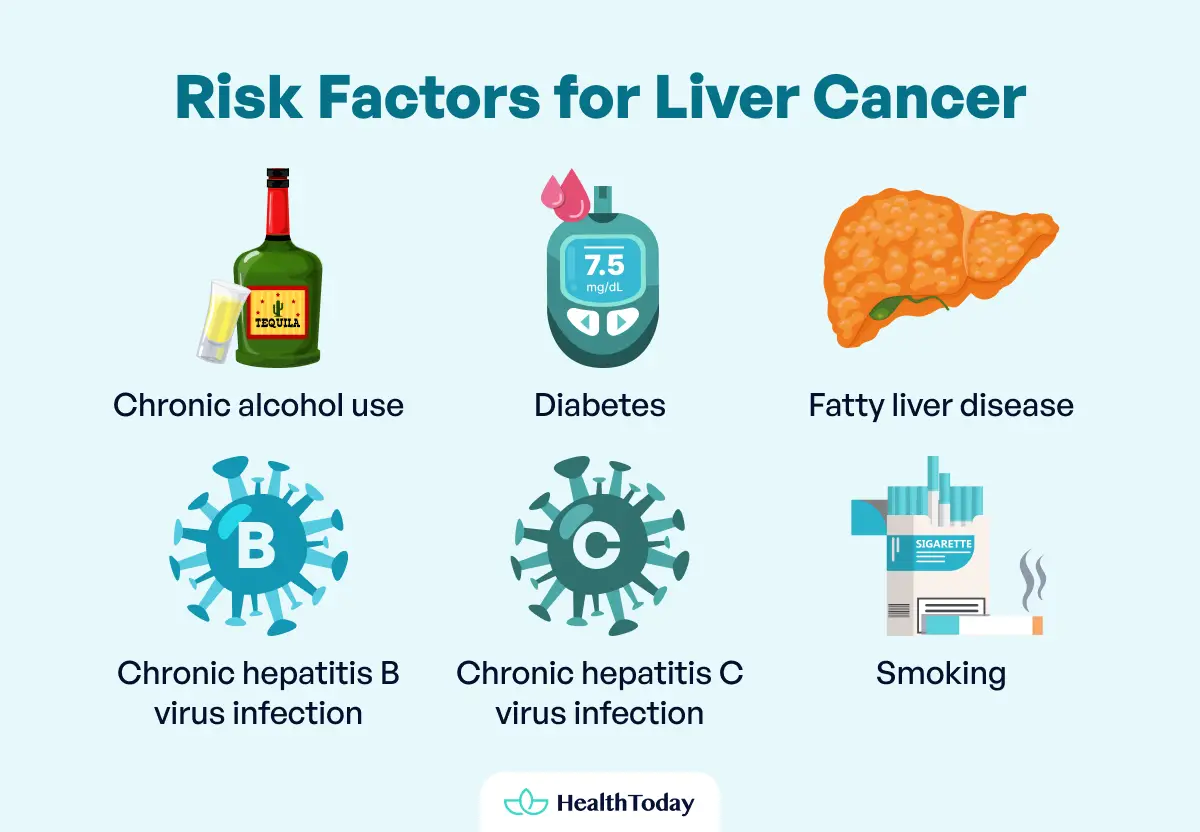Table of Contents
Liver cancer is a terrible disease that is often diagnosed at advanced stages. When it starts in the liver cells, it is called hepatocellular carcinoma (HCC).
Its mortality is high, and the available treatments don’t always work as well as expected. However, a new study presented a machine learning early detection tool that might greatly increase life expectancy.
Understanding liver cancer can save your life. Read on to learn about hepatocellular carcinoma, its symptoms, life expectancy, and how to prevent it.
We will also tell you about this new artificial intelligence (AI) tool that might improve early diagnosis and potentially boost your survival chances from 20 to 90 percent (1).
What is hepatocellular carcinoma (HCC)?
Hepatocellular carcinoma (HCC) is the most common type of cancer that comes from the liver. It occurs when the liver cells (called hepatocytes) grow uncontrollably and create a tumor. HCC is a serious condition that often develops in people with chronic liver disease, such as cirrhosis, hepatitis B or C infection, or problems like long-term alcohol use disorder (2).
The liver is a vital organ responsible for many functions like detoxification, protein building, supporting the immune system, and digestion (3, 4).
Therefore, conditions that affect your liver and reduce its activity can negatively affect your overall health. HCC is particularly dangerous because it severely impacts these life-sustaining functions.
Life expectancy with hepatocellular carcinoma
The life expectancy of HCC depends on many factors, including the stage of cancer at the moment of diagnosis, the presence of other health conditions, and liver function (5). It can vary widely from person to person. However, early diagnosis and prompt treatment typically lead to better outcomes.
Patients who are diagnosed at a very early stage and receive a liver transplant have up to a 70 to 80 percent chance of surviving for at least 5 years (6, 7). On the other hand, if the cancer has already spread, the prognosis is more challenging, and the likelihood of survival is much lower.

Liver cancer surgery survival rate
Survival rates can improve drastically after liver surgery. A 2014 study found that patients with stage 1 liver cancer who underwent a liver resection (removal of parts of the affected liver) had a median survival rate of close to 5 years.
Those who received a liver transplant had a median survival rate of 10 years. The same study found that patients diagnosed with stage 2 cancer had a median survival of 3.5 years after liver resection. With a transplant, their median survival was approximately 9 years (8).
Life expectancy with advanced HCC
A diagnosis of HCC at an advanced stage means the cancer has spread outside the liver to other parts of the body, such as the bones or lungs. In this case, life expectancy tends to be very low because of the increased cancer burden, which makes the disease more challenging to manage.
There are two ways of classifying cancer stages. The American Cancer Society uses the terms “localized, regional, and metastatic” while others use the TNM staging criteria, based on cancer size and spread (T), involvement of lymph nodes (N), and the presence of metastasis (M).
If the cancer is localized and contained within the liver, the prognosis for surviving at 5 years is 33 percent. However, if it is advanced and has spread regionally to lymph nodes near the liver, the survival rate is reduced to about 10 percent.
Sadly, if the cancer is metastatic and has spread across to other distant organs, the chances go down further to 2 percent (9).
This is why most treatments for advanced HCC are not intended to cure cancer but simply slow its progression. Besides that, doctors will give medications at the same time to provide symptom relief.
Hepatocellular carcinoma stage 4 prognosis
When looking at TNM criteria, stage 4 is the most advanced stage of HCC and indicates that the disease has migrated outside of the liver, for example, to the bones or other organs (10, 11).
As previously discussed, the prognosis for liver cancer that has metastasized is extremely poor. Stages 4a and 4b have 5-year survival rates of 10 and 2 percent, respectively (9).
Palliative care for symptom relief is the preferred approach at this stage.
It is important to note that these percentages are general estimates based on individual factors like other medical conditions. Your prognosis will depend on your specific situation.
Life expectancy for HCC depends on the cancer stage at diagnosis, overall health, and liver function. Early diagnosis and appropriate treatment are key to better outcomes. A very early diagnosis can lead to an improved 5-year survival rate. Surgery significantly improves survival. Treatment in advanced stages focuses on slowing cancer progression and alleviating symptoms.
New screening tool may increase the 5-year survival rate with HCC
A new study published by the American Journal of Pathology has presented a cutting-edge machine-learning tool for the early detection of liver cancer.
Researchers created an AI model that detected liver cancer in its early stages with 95 percent accuracy when it examined multiple different biomarkers in human serum samples (15).
The scientists studied blood from individuals with and without HCC. They identified abnormal genetic material, called fusion transcripts, that were common and easily identified in the cancer group.
These fusion transcripts appear when two different genes join by mistake, creating a new, abnormal gene section. Then, they trained the AI model to predict when a person was at high risk of developing HCC based on the levels of these fusion transcripts.
Screening for liver cancer is a way to detect the disease early, and doctors will usually do ultrasounds every 6 months for high-risk patients (12). In addition, they measure a blood molecule called alpha-fetoprotein (AFP), which can be elevated in individuals with HCC.
However, high levels of AFP might also appear with other diseases. There is also a high risk of false negative results with the AFP test (13, 14). In other words, the test result is negative when the disease is, in fact, present.
Researchers estimated that AFP testing, the most commonly used screening method for detecting HCC, had an accuracy of only 53.5 percent under certain conditions (15).
Surprisingly, the AI tool learned how to tell when a person might have liver cancer with an 83.3 percent accuracy using only the fusion transcripts results. When the tool also used AFP test results, its accuracy went up to an outstanding 95 percent (15).
The difference in the survival rate between early HCC diagnosis with surgical treatment and late diagnosis is impressive, as was previously discussed. Therefore, if this tool continues to perform successfully, it could revolutionize cancer screening and bring hope to millions of patients.
Symptoms and survival rates of liver cancer
Unfortunately, liver cancer symptoms often do not appear until the disease has reached an advanced stage. Apart from that, you might not be able to feel the tumor or its effects until it has grown a lot. Therefore, you must recognize the following symptoms of liver cancer as early as possible.
What are the symptoms of liver cancer?

Symptoms of liver cancer can be subtle and easily mistaken for other health issues. This is why they are often overlooked in the early stages. They include (16, 17):
- Unexplained weight loss
- Loss of appetite
- Abdominal pain or discomfort
- Nausea and vomiting
- General weakness and fatigue
- Enlarged liver (hepatomegaly)
- Accumulation of liquid in the abdomen (ascites)
- Yellow skin and eyes (jaundice)
If you notice these symptoms, you should consult a healthcare professional as soon as possible because early diagnosis can significantly change your prognosis.
Liver cancer survival rates by age
We already mentioned how survival rates for liver cancer can vary depending on several factors. Not surprisingly, age is one of the most important ones. Younger individuals typically have a better prognosis compared to older ones.
A study assessing the outcomes of patients with liver cancer based on their ages found that people under age 45 had a combined (all stages) 5-year survival rate of almost 15 percent. On the other hand, the survival rate for patients older than 45 was only 8 percent (18).
Another study presented the percentage of patients who died in different age groups. The results showed that patients who were diagnosed when they were under 50 had a mortality rate of 0.22 deaths per 100,000 person-years.
However, when patients were diagnosed between 50 and 69 years of age, the mortality went up to 4 per 100,000. Finally, patients diagnosed between ages 70 and 84 had a mortality rate of 9 per 100,000 person-years (19).
It is not a surprise that older people die more often. However, improved survival in younger patients with liver cancer might also be due to their better overall health, fewer other diseases, and a healthier liver.
Also, younger patients are more likely to qualify for advanced treatments like liver transplantation and tend to experience success with them (20). This can make a significant difference in outcomes.
It’s important to remember that these survival and mortality rates are only averages, and won’t necessarily predict a particular individual’s outcomes.
Liver cancer symptoms often do not appear until the disease is advanced. Common symptoms include unexplained weight loss, loss of appetite, abdominal pain, enlarged liver, abdominal liquid retention, and yellow skin and eyes. Survival rates vary by age, with younger patients having better survival rates overall. Mortality rates also increase with age. At all ages, early detection increases the potential for better outcomes, particularly in younger patients.
Liver cancer prevention
Reducing your risk of developing liver cancer is within your control. In fact, understanding and avoiding risk factors will decrease your chances of developing the disease.
Below, we will discuss the most important risk factors associated with liver cancer. Also, we will tell you how you can modify your diet to support a healthy liver.
Risk factors for liver cancer and preventive measures

You are most likely to develop liver cancer if you have chronic liver disease. More than 90 percent of HCC cases occur in individuals with chronic liver conditions, especially cirrhosis (2). Other important risk factors include:
- Chronic alcohol use
- Diabetes
- Fatty liver disease
- Chronic hepatitis B virus infection
- Chronic hepatitis C virus infection
These conditions cause long-term inflammation that can damage the DNA in your liver cells, increasing your risk of HCC (21, 22).
You can reduce this risk by adopting a healthy lifestyle. Besides that, minimizing or eliminating alcohol will lower your risk of liver toxicity and long-term damage.
Moreover, controlling conditions like diabetes and obesity through diet and exercise can help prevent fatty liver disease and its complications (23, 25).
As for exercise, moderate to high amounts of physical activity are associated with a lower risk of liver cancer compared to low amounts. Exercising at least 2 hours per week is recommended to reduce mortality (26).
Lastly, smoking has been linked to an increased risk of liver cancer. If you stop smoking early, you can reverse these negative effects (27).
What can you eat to prevent liver cancer?
Your diet plays an essential role in liver cancer prevention. A high consumption of white meat, fish, fruits, vegetables, and cereals protects you against liver cancer. On the other hand, eating more red meat and sugar can increase your risk of HCC (28).
Since inflammation plays an important role in liver cancer, you should consider maintaining an anti-inflammatory diet. Consuming blueberries, strawberries, apples, other fruits, vegetables, whole grains, nuts, and legumes helps reduce inflammation, which specifically supports liver health (29).
Preventing liver cancer involves protecting your liver from chronic diseases and damaging exposures. Risk factors include cirrhosis, chronic hepatitis, chronic alcohol abuse, diabetes, and fatty liver disease. Adopting a healthy lifestyle, drinking less alcohol, managing diabetes and obesity with diet and exercise, and quitting smoking can lower your risk. Regular physical activity and an anti-inflammatory diet can go far to reduce damage and support liver health.
New findings
Uncommon causes of liver cancer
Evidence shows that liver cancer can result from several factors at once. Some of the less common causes of HCC include (30, 31):
- Hemochromatosis (when your body absorbs too much iron)
- Obesity
- Aflatoxins (from eating contaminated products)
- Betel quid (psychoactive stimulant)
- Pesticides
If you are exposed to any of these factors, discuss the situation with your doctor to assess your risk.
New liver cancer treatments
New treatments for HCC have appeared in the last several years. Here are a few:
- Checkpoint inhibitors: Checkpoints are proteins that cells use to signal the immune system that it shouldn’t attack them. Cancer cells can take advantage of this mechanism to avoid being detected and killed. Checkpoint inhibitors are drugs that block this mechanism to help eliminate cancer cells (32).
- CAR-T cell therapy: Your doctor will take immune cells (T cells) from your blood, enhance and multiply them, and then inject them back into your body. These enhanced immune cells will detect and kill cancer cells in your liver (33).
- Targeted therapies: These treatments directly target cell parts that are important for the survival of cancer cells. Some of the mechanisms used include bringing toxins into the malignant cells, marking them for destruction by the immune system, or just stopping their growth (34).
- Immunotherapy: Treatments with oncolytic viruses are promising in the field of liver cancer. These viruses infect and kill cancer cells directly, without harming healthy cells (35).
Keep in mind that these are relatively new therapies, with some still undergoing tests for the liver cancer treatment. Ask your doctor about them to see if they might help you.
Can liver cancer go into remission?
Yes, liver cancer patients can go into full remission (36). The earlier you are diagnosed and receive treatment, the more likely you are to reach it. However, recurrences of the cancer are always possible.
What is life expectancy when chemo stops working for people with liver cancer?
The life expectancy of patients with liver cancer after unsuccessful chemotherapy varies and depends on the specific situation. You should ask your oncologist who will take into consideration your individual risks, the characteristics of your cancer, and your remaining treatment options.
How fast does hepatocellular carcinoma grow?
The growth rate of HCC can vary significantly, depending on factors like the patient’s other health conditions, the type of cancer, and the treatments received. Some tumors take a year to double their size, while more aggressive types can do this in as little as a month.
What stage is metastatic liver cancer?
Metastatic liver cancer is classified as stage 4b. That means that cancer has spread to organs that are far from the liver, such as the bones or the lungs. This is the most severe form of liver cancer, with a very low life expectancy.
Summary
Liver cancer is a terrible disease with high mortality rates. Early detection will significantly improve your survival chances. However, this is challenging because symptoms usually appear very late.
Recently, under controlled settings, scientists developed a machine learning algorithm for liver cancer screening with extremely high detection rates. If this tool reaches the same success rates in real-life settings, early detection will become easier. This could extend survival rates significantly and bring hope to millions of patients.
However, it is important to remember that prevention is still the best strategy. Taking charge of your health and reducing your risk of developing liver cancer can support a healthy liver and a longer life.

















Comments
0